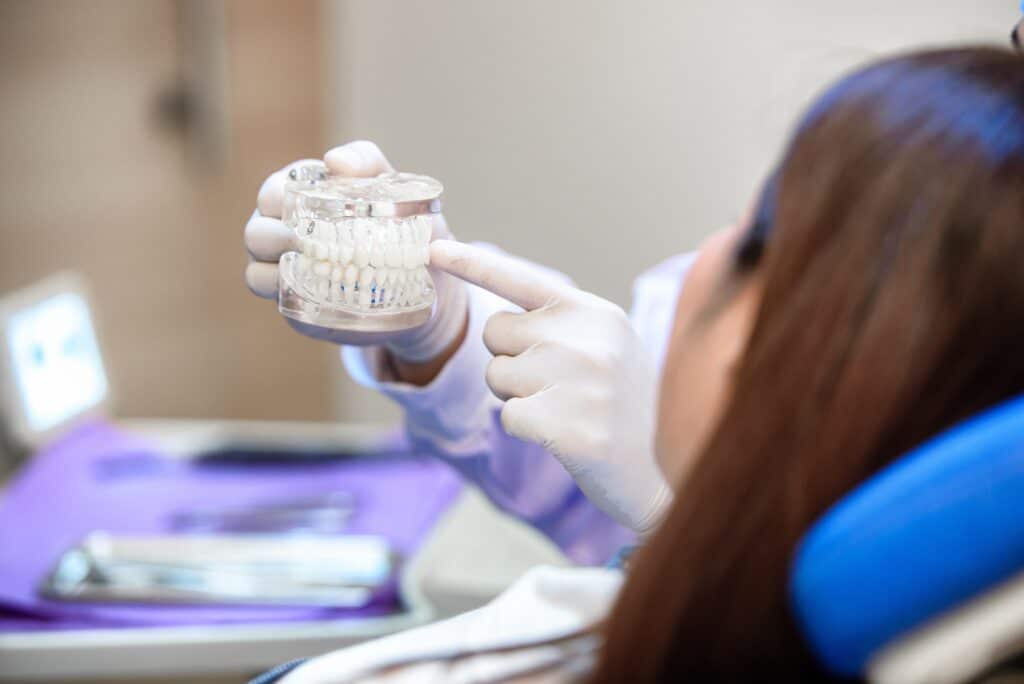What Causes Gum Disease?
Our mouths give a home to a huge number of microbes, both helpful and harmful. Bacterial waste creates a tacky substance, known as plaque, which sticks to the teeth. Brushing and flossing target eliminating plaque before it mineralizes into tartar. Afterward, tartar turns into a home for additional microbes to release toxins into the gums.
Gums react to this bacterial invasion with an inflammatory reaction because of your immune system. Around the foundation of every tooth, there is a small collar of gum tissue that forms a small pocket. This warm and dark environment provides a suitable habitat for drawing in tartar and bacteria to invade.
Early inflammation brings about bleeding gums, known as gingivitis. If the microbes are left untreated and undisturbed effectively, then they make chronic infection in the periodontal pocket. Generally speaking, the bone starts to weaken around the teeth. While gums might be slightly delicate at this stage, there’s for the most part an insignificant discomfort as the bone starts to erode.
Over half of the bone around your teeth can vanish before any indications of looseness or pain show up. The bone around teeth never recovers, so this pain becomes permanent and harder to control as the microbes hide deeper into the gums. Untreated gum illness prompts abscesses and tooth loss in many advanced cases.


Mouth-Body Connection
Much research shows a link between bacterial disease in your mouth and illness in other parts of your body. Some research shows a strong link between oral bacteria and other conditions for instance heart disease, arthritis, stroke, Alzheimer’s, and even some types of cancer. The connection between oral health and whole-body health has never been more understood than it is today.
As the bleeding gums provide a direct pathway into the bloodstream, the oral bacterias quickly enter the other parts of the body. It is similar to an open wound on your skin and can be very harmful to your overall health. This is the reason why researchers are continuing to identify oral bacteria deposits in different parts of our bodies.
Our body’s ability to fight infection lowers because of diabetes and other auto-immune disorders. This results in uncontrolled gum disease progressing at a faster rate and causing more harm. Research tells that inflammation in the mouth can worsen diabetes, making it difficult to control. This interlink between two chronic conditions tells how important it is to take care of our oral health.
Diagnosis
Before making a gum disease diagnosis we take into consideration several factors. The pocket which is a small collar of gum around each tooth generally sits 2-3 mm deep. This space can be easily cleaned by floss or toothpicks. Our proficient doctors or our hygiene team can measure as well as chart multiple areas using a small yet effective measuring device called a periodontal probe. In case these measurements are more than 3 mm and these bleed upon probing then periodontal disease is present. Here deeper reading indicates that the disease is more advanced. We at Manchester Family Dentistry will also examine and evaluate the shape and texture of your gums and any significant movement in each tooth. Alongside this, it is also vital to examine the shape, level, and density of the bone on digital x-rays. After collecting all the data, a clear understanding of your gum condition is established.
Gum Disease Treatment
A personalized treatment plan can be prepared after a diagnosis that tells the severity of gum disease. When it is in milder form with little or no bone loss, then one or two visits with our hygiene team will be enough to bring it under control. A strategic home care routine and an established schedule prepared by our team will make the condition better with little additional treatment.
In case the inflammation is big and the measurable bone loss is significant, then you need to consider a strong proactive approach to stop further deterioration. Often, we will propose soft numbing of your gums, and a more thorough cleanup process called root planing or scaling. It will take a few visits to clean up the mouth, as a portion of your mouth at a time will be deep cleaned. We will carefully clean the infected pocket around each tooth, including the mineralized tartar. These are cleaned using ultrasonic instruments and hands. After that polishing is done which establishes a glassy surface that helps to repel stain and plaque accumulation and it usually finishes the initial therapy.
Our proficient doctors at Manchester Family Dentistry may recommend a medicated rinse, an electric toothbrush, Waterpik, and other specified strategies to help you with your home care routine and your oral hygiene. Remember that we can only control gum disease but cannot cure it. It requires consistent and dedicated efforts to control this disease.

Maintenance Matters
Regular home care of your oral health is very important to control the progression of gum disease. Within the first few hours of cleaning the bacteria, it again begins to populate and adhere to the teeth. Within 24 hours the plaque is left undisturbed, then it will start to harden and mineralize within 24 hours. Keep in mind that deeper gum pockets require even more perseverance to stop the bacteria from undermining and weakening the foundation of your teeth.
A faithful maintenance schedule is important as the gum pockets previously damaged by bacteria are hard to recover. Depending on the severity of the disease, we can create a customized plan to include 2, 3, or 4 visits a year. This also depends on the response to treatment and the consistency of home care.
In case our combined and consistent efforts don’t slow or stop the progression of the gum disease, then we will suggest referral to a specialist in this field known as a periodontist.

